Related Research Articles
Seven ships of the Royal Navy have been named Warspite. The origins of the name are unclear, although it is probably from the Elizabethan-era spelling of the word 'spite' – 'spight' – in part embodying contempt for the Navy's enemies, but which was also the common name for the green woodpecker, suggesting the 'Warspight' would poke holes in enemy ships' (wooden) hulls. Until 1919 a woodpecker was used as the ships' crest; the official badge was a cannon, although the woodpecker continued to be used on the ships' tompions or gun muzzle plugs. Warspite carries the most battle honours of any ship in the Royal Navy, with the sixth Warspite being awarded fifteen of them.
Eight ships of the Royal Navy have been named HMS Ardent, whilst another two were planned:
Six ships of the Royal Navy have been named HMS Edinburgh, for the Scottish city of Edinburgh. In addition, one ship of the Royal Navy has carried the similar name HMS Duke of Edinburgh.
Seven ships of the British Royal Navy have been named HMS Orion, after the hunter Orion of Greek mythology:
Six ships of the Royal Navy have been named HMS Rodney, of which at least the last five were named after the Georgian Admiral George, Lord Rodney. A seventh was planned but never completed:
Twelve ships of the Royal Navy have been named HMS Repulse:
Six Royal Navy ships have borne the name HMS Southampton. All were named after Southampton, a port on the south coast of England.
Eight ships or submarines of the Royal Navy have been named HMS Anson, after Admiral George Anson:
Several ships of the Royal Navy have been named HMS Howe, after Admiral Richard Howe:

Three ships of the Royal Navy have borne the name HMS Glowworm after the insect, whilst two more were planned:
Four Royal Navy ships have been named HMS Grenville. Vice Admiral Sir Richard Grenville was an Elizabethan sailor, explorer, and soldier:
Thirteen ships of the Royal Navy have been named HMS Shark after the shark:
Three ships of the Royal Navy have been named HMS Sandown. Sandown is a seaside resort on the Isle of Wight, England.
Seven ships of the Royal Navy have been named HMS Orpheus. Orpheus was the magical father of songs in Greek mythology.
Three ships of the Royal Navy have been named HMS Swordfish after the fish.
Five ships and a number of shore establishments of the Royal Navy have borne the name HMS Daedalus, after the mythical Daedalus:
Several ships of the British Royal Navy have been named HMS Partridge, after the bird.
Three vessels of the British Royal Navy have been named HMS Nerissa:
Three ships of the Royal Navy have borne the name HMS Arabis, after the flower, the Arabis.
Five ships of the Royal Navy have carried the name HMS Handy:
References
- Colledge, J. J.; Warlow, Ben (2006) [1969]. Ships of the Royal Navy: The Complete Record of all Fighting Ships of the Royal Navy (Rev. ed.). London: Chatham Publishing. ISBN 978-1-86176-281-8.